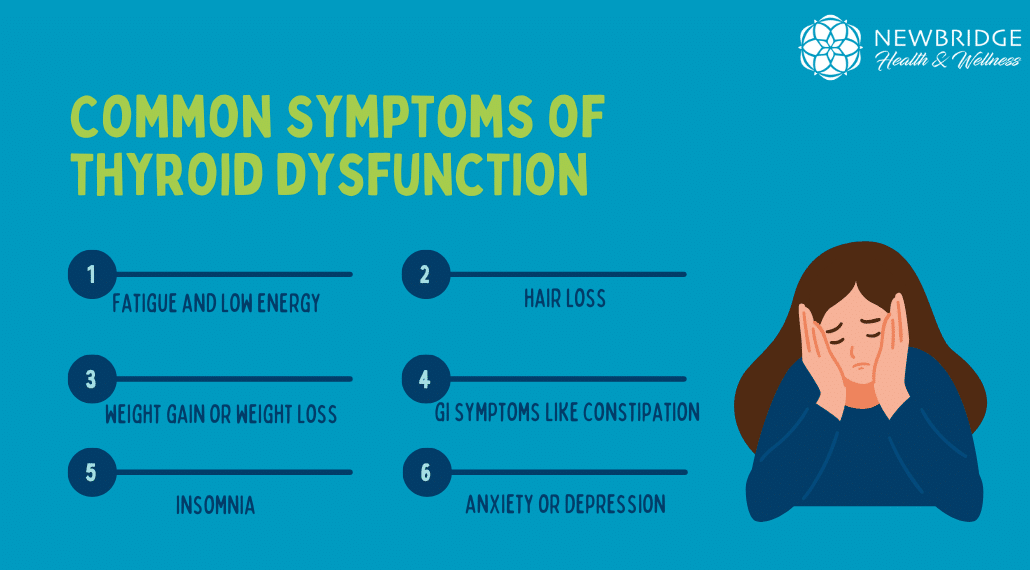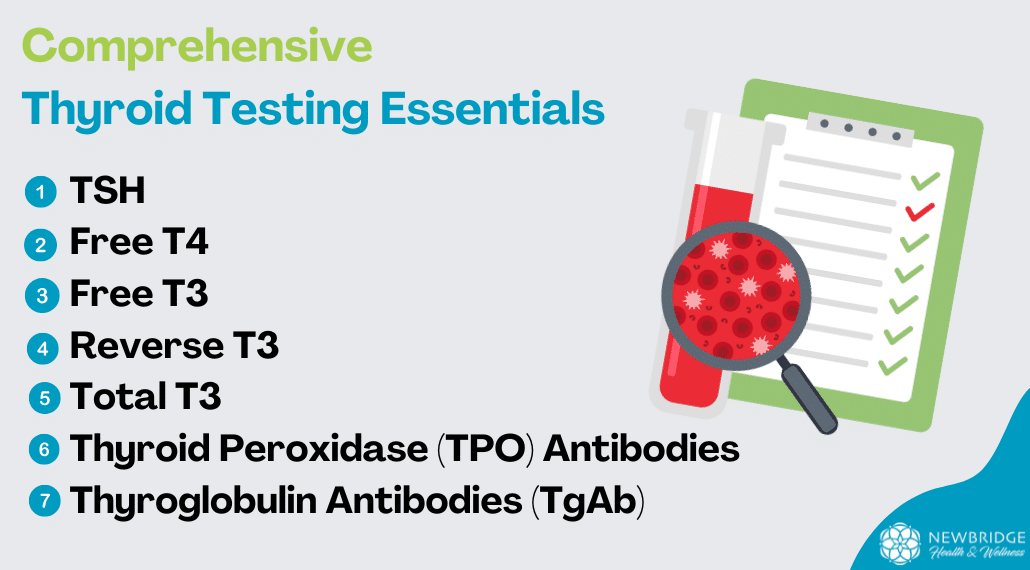The thyroid plays an essential role in maintaining overall health. This small gland regulates metabolism, energy levels, mood, and even immune function. Unfortunately, research shows that thyroid disorders are on the rise in the US. Yet, for many, these issues can remain undiagnosed or poorly managed under conventional care. If you’ve been diagnosed with thyroid dysfunction but continue to struggle with symptoms, or if you suspect your thyroid may be causing your unexplained symptoms, a functional medicine approach might be the answer. Our team at Newbridge goes beyond simple thyroid testing to uncover root causes, address lifestyle factors, and create a personalized, integrative approach to thyroid health.
The Importance Of Thyroid Beyond Metabolism
While thyroid health is often associated with metabolism, this small gland influences nearly every system in the body. Brain function, heart health, digestive function, skin, hair, and even immune health all rely on proper thyroid hormone levels. Research shows that even subclinical thyroid imbalances—those not always detected in conventional tests—can impact cognition, mood, and overall quality of life
Common Symptoms of Thyroid Dysfunction Include:
– Fatigue and low energy
– Weight gain or difficulty losing weight
– Insomnia or poor-quality sleep
– Hair loss or brittle hair
– Anxiety or depression
– Dry skin or sensitivity to cold
– Constipation or other GI symptoms
– Cold hands and feet
If these symptoms sound familiar, but thyroid issues haven’t been definitively diagnosed, you may benefit from a comprehensive thyroid evaluation. Schedule an intake at Newbridge to get started with one of our thyroid-educated providers.

Why The Thyroid Tests Your Doctor Ordered May Not Tell The Whole Story
In conventional medicine, thyroid health is often assessed solely by measuring Thyroid Stimulating Hormone (TSH). However, research shows that TSH alone doesn’t provide a full picture of thyroid function, and many individuals with thyroid symptoms remain undiagnosed when only TSH is tested (Soh & Aw, 2018).
In Functional Medicine, the following tests are typically ordered so that providers can get a full-look at thyroid function:
1. TSH (Thyroid Stimulating Hormone): Often used as an initial screening but not always conclusive.
2. Free T4: Measures available thyroxine hormone (the inactive/stored form of thyroid hormone).
3. Free T3: Measures the active form of thyroid hormone (which is converted from T4).
4. Reverse T3: Evaluates how T3 is used by the body.
5. T3 Total: Assesses overall level of the hormone circulating in the bloodstream.
6. Thyroid Peroxidase (TPO) Antibodies: A marker of autoimmune thyroid disorders like Hashimoto’s.
7. Thyroglobulin Antibodies (TgAb): Also helps identify autoimmune conditions.
These tests can uncover imbalances and autoimmune activity that TSH alone often misses.

Key Thyroid Conditions And Their Complexities
Thyroid conditions can manifest in various forms, each with distinct symptoms and challenges:
– Hypothyroidism: Results in low thyroid hormone levels, often causing fatigue, weight gain, and mental fog.
– Hyperthyroidism: Leads to high hormone levels, causing symptoms like weight loss, anxiety, and heart palpitations.
– Hashimoto’s Thyroiditis: An autoimmune condition where the immune system attacks the thyroid, typically resulting in hypothyroidism over time.
– Graves’ Disease: Another autoimmune condition that causes hyperthyroidism and similar symptoms to hyperthyroidism.
These complex conditions require accurate diagnosis and often a multifaceted approach to management, with medication being only one part of proper treatment. Comprehensive testing is critical, as each of these conditions may present uniquely in test results and may fluctuate over time.
Functional Medicine’s Comprehensive Approach To Thyroid Health
Functional medicine goes beyond medication to explore underlying causes and contributing factors. By addressing everything from diet to lifestyle, our Newbridge functional medicine team provides holistic support that aims to bring lasting thyroid balance. Here’s how we approach thyroid health:
1. Comprehensive Testing and Diagnosis:
As described above, our providers emphasize thorough thyroid testing, considering TSH, Free T3, Free T4, Reverse T3, Total T3, and antibody levels to understand each patient’s unique thyroid function.
2. Root Cause Analysis:
Functional medicine practitioners look at factors like nutritional deficiencies, environmental toxins, and hormone imbalances that may impact thyroid health:
– Nutrient Deficiencies: Low levels of selenium, iron, and vitamin D can worsen thyroid function, and research supports the benefits of these nutrients to support thyroid health.
– Hormonal Imbalances: Imbalances in adrenal or insulin hormones can intensify thyroid issues, so balancing these hormones is essential for thyroid health.
– Environmental Toxins: Heavy metals, industrial pollutants, chemicals (like those in cleaning agents), and toxins like mold can disrupt thyroid function, and detoxification strategies may reduce their impact.
—> Watch a short video on Thyroid Health from our founder, Stephanie Belseth, APRN, CPN
3. Gut Health and the Microbiome:
Research links thyroid health to the gut microbiome, suggesting that an imbalance in gut flora can aggravate autoimmune thyroid conditions like Hashimoto’s. Restoring gut health often reduces inflammation and supports the immune system.
4. Sleep and mental health:
Functional medicine recognizes the role of lifestyle factors in thyroid function – stress, sleep quality, and mental health all influence thyroid hormones, and conversely, thyroid hormones can influence your mood.
5. Dietary Modifications and Nutritional Support:
A nutrient-dense diet rich in anti-inflammatory foods is crucial for thyroid health. Diets like the Autoimmune Protocol (AIP) have shown success in reducing thyroid-related symptoms and improving quality of life for those with Hashimoto’s.
– Selenium: Essential for thyroid hormone synthesis and reducing inflammation.
– Vitamin D: Reduces autoimmune activity and supports thyroid function.
– Iodine: Key for thyroid hormone production, though supplementation should be supervised to avoid overuse.
6. Ongoing Monitoring and Adjustment:
At Newbridge, we believe in ongoing support. Thyroid health can change over time, so continuous monitoring and personalized adjustments are crucial to maintaining optimal thyroid function and overall wellness.
Why Seek Out A Functional Medicine Provider for Thyroid Health?
At Newbridge, our team of functional medicine providers is dedicated to helping you take a comprehensive, holistic approach to thyroid health. From detailed testing to lifestyle modifications and support for mental health, we design a treatment plan that goes beyond symptom management and medication to thoroughly address the root causes of thyroid dysfunction. Our practitioners are equipped to work with complex thyroid cases and provide integrative therapies that complement or enhance traditional hormone replacement therapy.
Take Charge Of Your Thyroid Health
If you’re struggling with ongoing symptoms of thyroid dysfunction, or if you suspect you may have a thyroid imbalance, functional medicine offers a pathway to holistic, evidence-based care. Working with a dedicated provider can be the key to uncovering the root causes of your symptoms and crafting a personalized plan to support lasting health.
For more information on the role of comprehensive testing, personalized care, and lifestyle changes for thyroid health, connect with Newbridge today.


